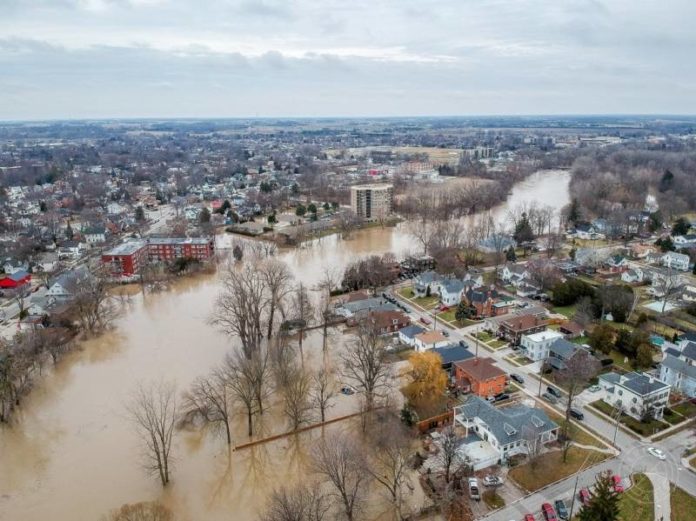Conservation Ontario officials say they are pleased that the report released last week by the Province’s Special Advisor on Flooding recognizes the critical role that conservation authorities (CAs) play in Ontario’s flood management.
Conservation Ontario officials say flood management in Ontario is a shared responsibility among municipalities, emergency management officials, the Province and conservation authorities.
This report recognizes the value of the conservation authority model and recommends that the Province ‘consult with the conservation authorities on their application of the natural hazards-based approach and risk-
based approach to managing flooding’, Conservation Ontario officials say.
“A quick scan of the 66 recommendations shows us that Mr. McNeil appreciates the collaborative nature of flood management in Ontario,” stated Kim Gavine, General Manager of Conservation Ontario which represents the 36 conservation authorities.
“We’ve worked well with the Province, to date, and we look forward to continuing to develop improvements. We’re very pleased to see that he appreciates the collaborative approach, however, maintaining and making improvements in Ontario’s flood management programs requires resources that include appropriate policy and program support.”
Gavine added: “For example, the 50 per cent reduction to conservation authorities’ provincial transfer payments for the natural hazards program affected all CAs and erode our ability to effectively address issues raised by the Flood Advisor.”
Conservation Ontario officials say following up from a difficult spring flood season that stretched into the summer months, the Province appointed Doug McNeil as Special Advisor on Flooding to conduct an independent review of flood management and the 2019 flood events in Ontario and provide advice to the Minister of Natural Resources and Forestry.
McNeil examined Ontario’s current flood management framework, exploring the various roles of agencies, such as conservation authorities, who are involved in reducing flood risk, as well as reviewing the policies and technical guidance which makes up the policy framework for flood management in Ontario, Conservation Ontario officials say.
Conservation Authorities reduce flood risk by relying on a watershed management approach.
“The mandate of conservation authorities is the conservation, restoration, development and management of natural resources,” Gavine stated.
“Using a watershed-based approach has effectively protected Ontarians for years and helped to avoid many more millions of dollars in damages and business disruptions. It also helps to build resiliency in local watersheds helping our communities to adapt to the growing impacts of climate change more easily.”
Conservation Ontario officials say in addition to operating $3.8 billion worth of flood control infrastructure, CAs also bring added protection and benefits through various watershed management programs and activities
such as:
– Watershed scale monitoring, data collection/management and modelling,
– Wwatershed scale studies, plans, assessments and/or strategies as well as
– Watershed-wide actions including stewardship, communication, outreach and
education activities.
Conservation authorities are recommending to the Province that these kinds of foundational watershed management activities be captured in the Conservation Authorities Act regulations which are currently being developed, Conservation Ontario officials say.
Conservation Ontario will be working with the conservation authorities to review the report in more detail and look forward to continue to collaborate with Province to reduce the risk of flooding in Ontario.
Ontario releases report from special advisor on flooding
The Ontario government is taking action to strengthen the province’s resiliency to flooding.
“The safety of the public and the protection of our communities is our number one priority,” said John Yakabuski, Minister of Natural Resources and Forestry, in a media release.
“After last spring’s flooding, we recognized that we needed an external perspective on the current roles and responsibilities of the governments, agencies and organizations involved in flood management – someone who could provide independent advice on improvements we can make.”
In July, Minister Yakabuski named Doug McNeil as Special Advisor on Flooding, and charged him with conducting an independent review of flood management and 2019 flooding events in Ontario. The Special Advisor delivered his report to the Ontario government on October 31.
In his review, Mr. McNeil confirmed that this year’s record-setting flooding in many parts of the province was caused by a combination of weather conditions: colder-than-average winter and spring, higher-than-average snowpack, lack of significant winter thaw, rapid snow melt and significant rain events in the spring.
Mr. McNeil found that nothing pointed to human error or the negligent operation of water control structures as the cause of the flooding, and that the government and its partners were effective at reducing and mitigating flood risks.
“Mr. McNeil looked carefully at the core components of the Province’s approach to emergency management relative to last spring’s flood season and found that steps taken by individuals, municipalities, dam owners, and other agencies were effective in reducing further potential damage to communities,” said Minister Yakabuski.
“We are pleased by this conclusion, and we appreciate Mr. McNeil’s practical advice for the Province and other parties to help us to become more flood resilient.”
Since the spring, the government has taken significant steps to help increase the province’s resiliency to flooding:
– Initiated procurement for its first-ever broad, multi-sector provincial climate change impact assessment that will help the province, municipalities, Indigenous communities and other local partners make more informed decisions to keep communities and people healthy and safe.
– Opened the Green Stream infrastructure fund of the Investing in Canada Infrastructure Program (ICIP), enabling smaller municipalities to access approximately $200 million in federal and provincial funding to invest in critical water, waste water and storm water projects.
– Launched a $1 million pilot project under the Municipal Disaster Recovery Assistance program to help municipalities rebuild damaged infrastructure to make it more resilient to extreme weather.
– Made it faster for property owners to get the approvals they need to repair flood-related damage to shorelines.
Ontario has already committed to taking the following actions to address recommendations from the Special Advisor’s report:
– Modernize regulations under the Conservation Authorities Act to have conservation authorities focus on their core mandate of protecting people and property from flooding and other natural hazards.
– Launch a comprehensive review of Ontario’s natural hazard technical guides and guidelines related to flood forecasting and warning.
– Ensure the continued investment of over $4.7 million in the hydrometric (stream gauge) network to enable flood forecasting and flood warnings that help municipalities better prepare for flood events.
The Province is reviewing the remaining recommendations along with its partners and will work together to increase the awareness of flood risks and help build Ontario’s resiliency to flooding.
















